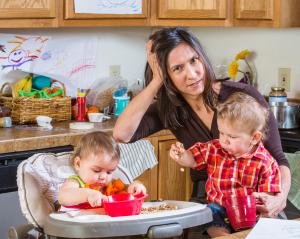This article is part of a series on the “Liturgy of Domestic Church Life.” To discover ways to experience more grace at home, join our facebook discussion group, CatholicHŌM (Households on Mission)–Family Discipleship.
discussion group, CatholicHŌM (Households on Mission)–Family Discipleship.
Every parent has had that moment where our kids get under our skin and we react. We might find ourselves lashing out, or making threats we know we have no intention of following through on, or punishing too severely, or just giving up, or a million other things that make us feel ineffective and undermine our power as a parent.
Many of these reactions are rooted in attachment wounds we received in our families-of-origin. Healing these wounds requires us to become aware of the unconscious scripts that drive our actions so that we can intentionally redirect our emotional energy down healthier paths.
Remember, the Liturgy of Domestic Church Life–like liturgy in general–is a tool God uses to heal the damage sin does to our relationships. Instead of beating up on ourselves for responding to our children in less-than-ideal ways, the Liturgy of Domestic Church Life asks us to bring these moments to God and consecrate them so that he can heal us and transform these experiences into moments of grace. We need to be willing to say, “Lord, I know that I am not being the parent you want me to be. Give me the grace to fill in the gaps between what I am able to give my child and what you want to give my child through me.”
In addition to bringing these moments to God, it can be helpful to pray through what I call the Four Questions Exercise (this exercise is outlined in detail in the new, upcoming 3rd edition of Parenting with Grace).
1. How did my mom and/or dad approach situations like this?
2. As a child, did their approach draw me closer to them or make me afraid of/close off to them?
3. Would I want my child to feel the same way toward me as I did toward my parent in this situation? If not, how would I like them to feel toward me?
4. How could I need change my approach so that I could effectively address this problem, but still allow my child to feel the way I would have wanted toward my mom and/or dad?
The point of this exercise isn’t to condemn your parents. Every parents does the best they can with what they have. The point is to make us more thoughtful about how our own experiences with our parents continue to influence our own relationship with our children and whether or not we would like those patterns to continue. This exercise allows us to make sure we’re giving our kids the correction that they need, but to do it in a manner that is both effective and actually strengthens our relationship with our kids rather than undermining it.
But why should we care about our relationship with our kids? Isn’t the most important thing just correcting their behavior? Yes and no. When we correct our kids in a manner that closes them off to us (or makes them afraid of us) the lessons we are trying to convey tend not to stick. Brain science tells us that learning is impaired when we are stressed. Although conventional wisdom says that unless we come down hard on our kids they’ll never learn, science actually shows the opposite. The harsher we are, the more we undermine our own effectiveness. Kids focus on the fact that “Mom/Dad is mad” instead of “I did something wrong and I need to do better next time.”
The more we can be conscious of where our reactions are coming from and how we can respond to our kids’ problem behaviors in a manner that allows them to open up to us, the more we can make sure the lessons we’re trying to teach will sink in. Let the Liturgy of Domestic Church Life bring about the healing God wants for your heart and your home.
Need more help healing the hurts that undermine our relationship with our kids? Visit CatholicCounselors.com to learn more about our books, resources and Catholic tele-counseling services.